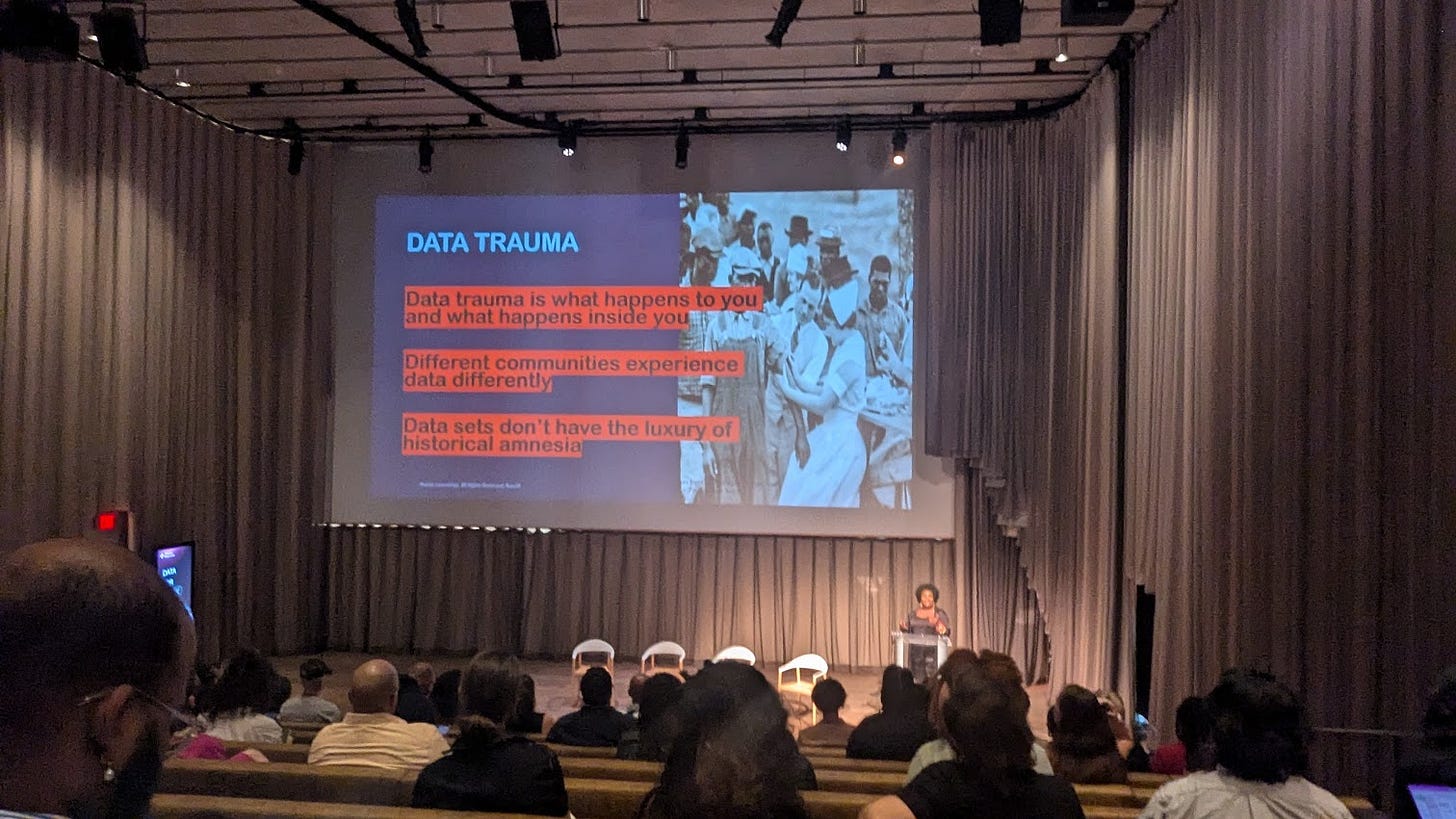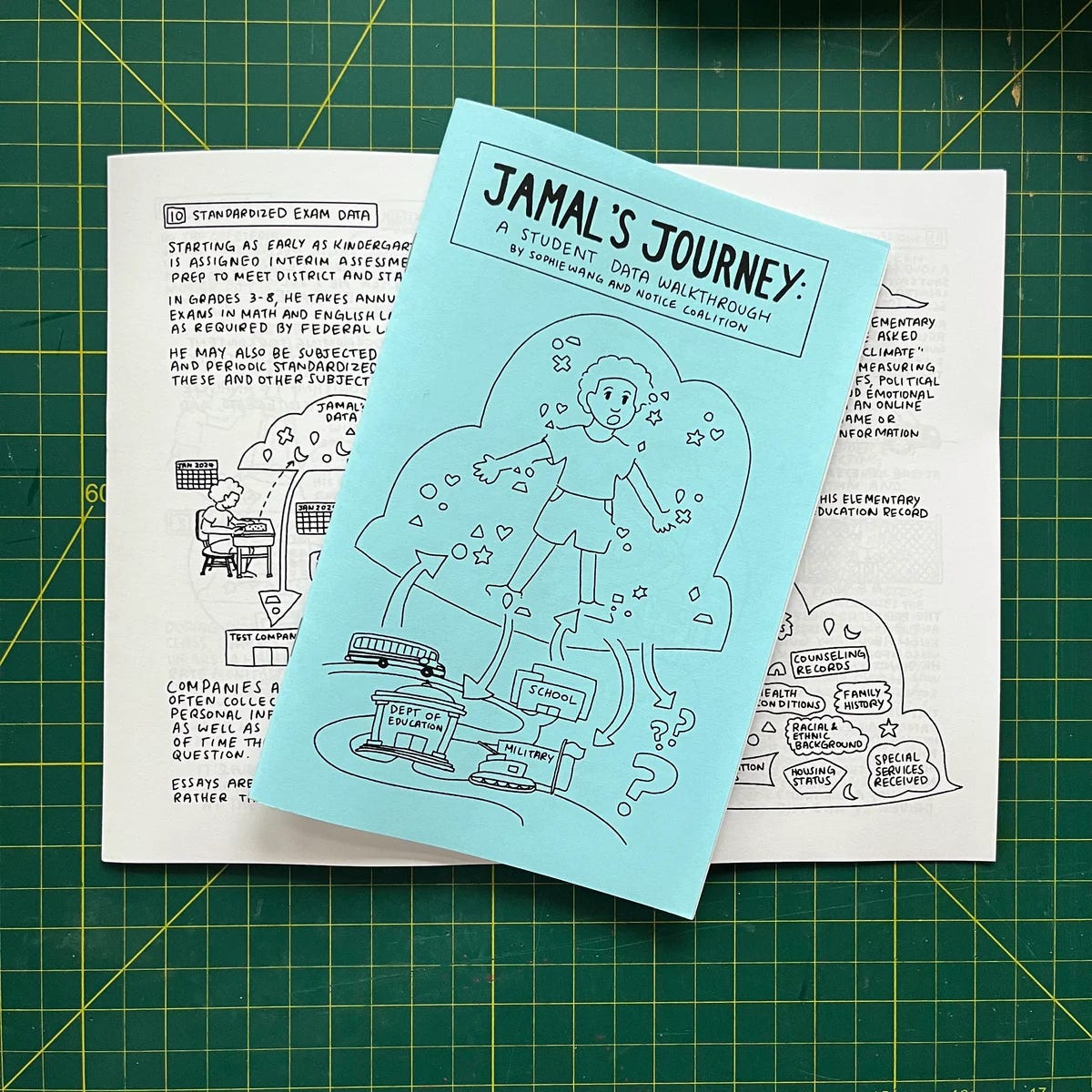Introducing a new update series!
Interested in planting seeds for data rights in your community? This is the first dispatch in a new series about experiments to build data rights knowledge and mobilize communities to action!
Welcome to…
Dispatch from the Data Garden 🍅
A new section of Civic Source dedicated to documenting experiments in data rights education practices. While the main newsletter will continue as a space to theorize about expensive possibilities for data rights as a tool for collective empowerment, this series will be a more grounded space for folks to see behind the curtain and join the work of spreading tools and resources about data rights principles throughout our communities.
🌱 Sowing seeds of new knowledge… The data garden is a metaphorical space grounded in place and in community, where we can start to think of data not as digital matter stored in a cloud far away, but in our soil, cultivated by our hands.
The data garden is a space of growth and possibility, where stories can emerge naturally from people who plant the seeds. The lush harvest of the data garden must be protected at all costs from predators who want to swoop in and extract its precious nutrients and use community data to their own advantage.
Caught me in the wild!
I really enjoyed being a part of Data for Black Lives III held in Miami at the Perez Art Museum last November. I highly recommend checking out the recording of the opening which featured a beautifully grounding performance and incredible invitations from Yeshi Milner and Dr. Fallon Wilson to build community institutions for liberatory futures to endure shifts in sociotechnical landscapes that seek to separate us from our collective purpose to live in alignment with each other, our ancestors, and the natural world.
You can see the rest of the streamed content from D4BLIII on their YouTube page, including my panel with Noni Session, Dr. Michael Akinwumi, Natasha Duarte, and Rasheedah Phillips. Our panel “Reparations AI: Housing” invited participants to speculate about ways data could be used as a transformative tool to restore and invest in Black communities harmed by racial injustice through the housing industry.
📖 Creating a more accessible lexicon for data rights… The way we talk about data is skewed toward people who directly touch datasets or work with data itself. This is a hugely inhibiting force for a majority of the general public to understand how to engage with data politics. The emerging reality of our datafied world is that even people who aren’t comfortable with data will have to be a part of figuring out how it should be used, especially when it comes to data about them and their community!
That’s why I’ve started testing new language to describe the data rights landscape —language that doesn’t revolve as much around technocratic modes of data governance, but that rather describes the sociopolitical structures around how data is extracted and used (or abused).
Unjust data narratives: The fight for data is fundamentally a fight to control narratives — narratives that are used by people in positions of power to make decisions or generate profit. Unjust data narratives are the primary product of data extraction practices that reinforce the power of harmful systems.
Why this language works:Academics call the fight for data rights an issue of “control over access to personal information,” which is both a mouthful and is rather abstract. Drawing people’s attention to the stories that are created about them when “bad people” are in control can help make the injustices of data extractivism into something real and show the importance of seeking collective control.
Using the language of stories helps to connect data injustices to a core element of the human experience — our soul connection to stories. Stories are core to how humans understand diverse perspectives and are a key part of how we learn. Connecting data rights to the inherent right we have to tell our own stories shows why data rights issues are universally important.
Many organizers and advocates are already familiar with the need to control narratives in culture and media in order to fight back against injustice. Harmful narratives in the media not only hurt individuals, but can be weaponized against entire groups of people. Talking about unjust data narratives allows us to think about how data extractivism not only leads to violations of personal data privacy rights but can also be weaponized against entire groups.
It’s important that language about data rights evolves beyond policy and academia. We need new terms that are broad and accessible to allow more people to participate in conversations about how data is being used by powerful people and institutions.
🤔What do you think about unjust data narratives as a term to include in conversations about data rights? Is there another way you’d frame the issue?🤔
Experiment: Rights-based data strategies for organizations
Last summer, I started working with Bayou City Waterkeeper (BCWK), a Houston-based organization fighting for water quality, wetlands protection, and flood mitigation through legal advocacy and community organizing. Our goal was to help the organization move towards implementing a rights-based data strategy.
In the past, I’ve been interested in grassroots collective data practices like data cooperatives or community data trusts, but after talking to people in my own community who would be the best candidates to participate in such projects, I realized that many organizations have very little capacity or resources to effectively work with their own data, let alone to share with others.
Lesson: Setting up practices to get good at sharing data within your organization makes it much easier to start sharing data strategically with external partners. Using data in just and equitable ways means using it to start conversations between staff that increase understanding, communication, and collaboration.
The project to help BCWK with a rights-based data strategy has also revolved around helping the organization address a fundamental need to integrate data more deeply into the wide range of advocacy and organizing work that they do. For many community-serving organizations, this can be a daunting task because introducing data as a tool can sometimes be alienating to non-technical staff or to community members, creating perceptions of hierarchies of knowledge that make it harder for people to work together.
Lesson: Orienting internal data practices around data rights helps to ground technical teams in practices that are inclusive and accessible to people who are represented in the data. Doing so allows non-technical staff and community members to have a meaningful role in deciding how data should be used.
Community members need to be a part of determining how data is used by organizations that represent them, and been also begin using that data themselves to become their own advocates. With that in mind, community organizations often need to play an intermediary role by processing data that comes in from governments or other institutional sources, and sharing data in accessible ways that meet the requests or needs of the people they serve.
Lesson: A rights-based data strategy should create space for people interacting with different audiences to unpack how the data needs of their audience differ. This way teams can also communicate and work together to ensure data rights principles are being met in practice.
The work continues… These are preliminary insights from research and conversations conducted with my main collaborator and co-conspirator Mashal Awais, Community Science Manager at BCWK. Mashal is a trained environmental scientist and GIS specialist interested in deconstructing traditional methods of data use in community contexts. People like her are the reason this work matters! We'll continue to share insights and resources as this work develops.
Reach out for more information about resources and tools to support rights-based data strategy work for grassroots or movement organizations.
✨ Inspiring work in science and technology education… Free Radicals is an activist collective dedicated to creating a more socially just, equitable, and accountable science. They create accessible resources for political education on the intersection of science and social justice and offer collaborations with politically aligned organizations on issues related to science and technology.
Their zines are vibrant and engaging, using art to illustrate topics like Walmart’s use of technology to exploit workers, Seuss-style systems of data extraction, and LAPD’s abuses of data for predictive policing.
I found out about Free Radicals’ work through Sophie Wang who also created a zine for the NOTICE Coalition called Jamal’s Journey. The zine is a walk-through of 22 real-life ways that student data is collected, shared, sold, or stored, and what some of the issues and impacts are that surround this surveillance. Explore more of Sophie’s work or purchase the zine.
Art has an essential role in translating difficult concepts like data rights into easily understandable themes. Because technical systems are often invisible and abstract, I like depicting them through natural analogs (like flowers and tomatoes!) to help people ground their understanding in embodied contexts. Watch this space for more artistic interventions in popular education around data rights!
Where I’ll be next…
RightsCon Taipei 2025. Catch me at these talks or panels in-person!
Tuesday, February 25 at 9am: “Data has a beating heart: situating environmental data and rights in embodied landscapes”
Workshop hosted by myself and Emelia Williams in collaboration with the Open Environmental Data Project.Tuesday, February 25 at 11:30am: “Navigating GeoAI for climate action: potential and pitfalls”
Group dialogue with Dona Mathew, Digital Futures Lab; Pyrou Chung, Open Development Initiative; and Ruth Schmidt, FAIR Forward on AI’s uses for climate action and ways to empower climate organizers through emerging data practices.
Wednesday, February 26 at 12:45pm: “Data rights, data protection, and protection from dangerous data”
Speaker showcase where I’ll be giving a lightning talk on lessons and strategies for liberatory local data futures!
National Technology Education Network 2025 Conference. Presenting on data rights tools and resources for nonprofit organizations. Details TBA.
See you out in the big bad world! 🌎 What’d you think of this dispatch? Let me know or drop me an email if there’s something else you’d like to see.






